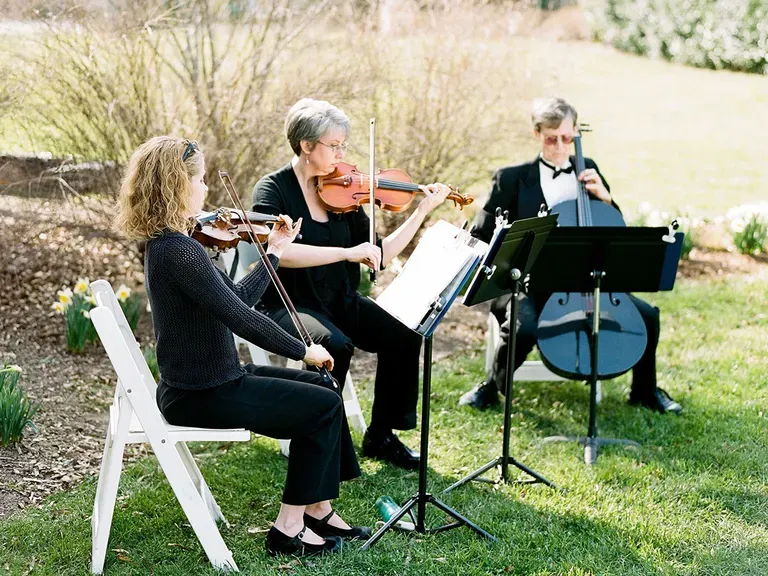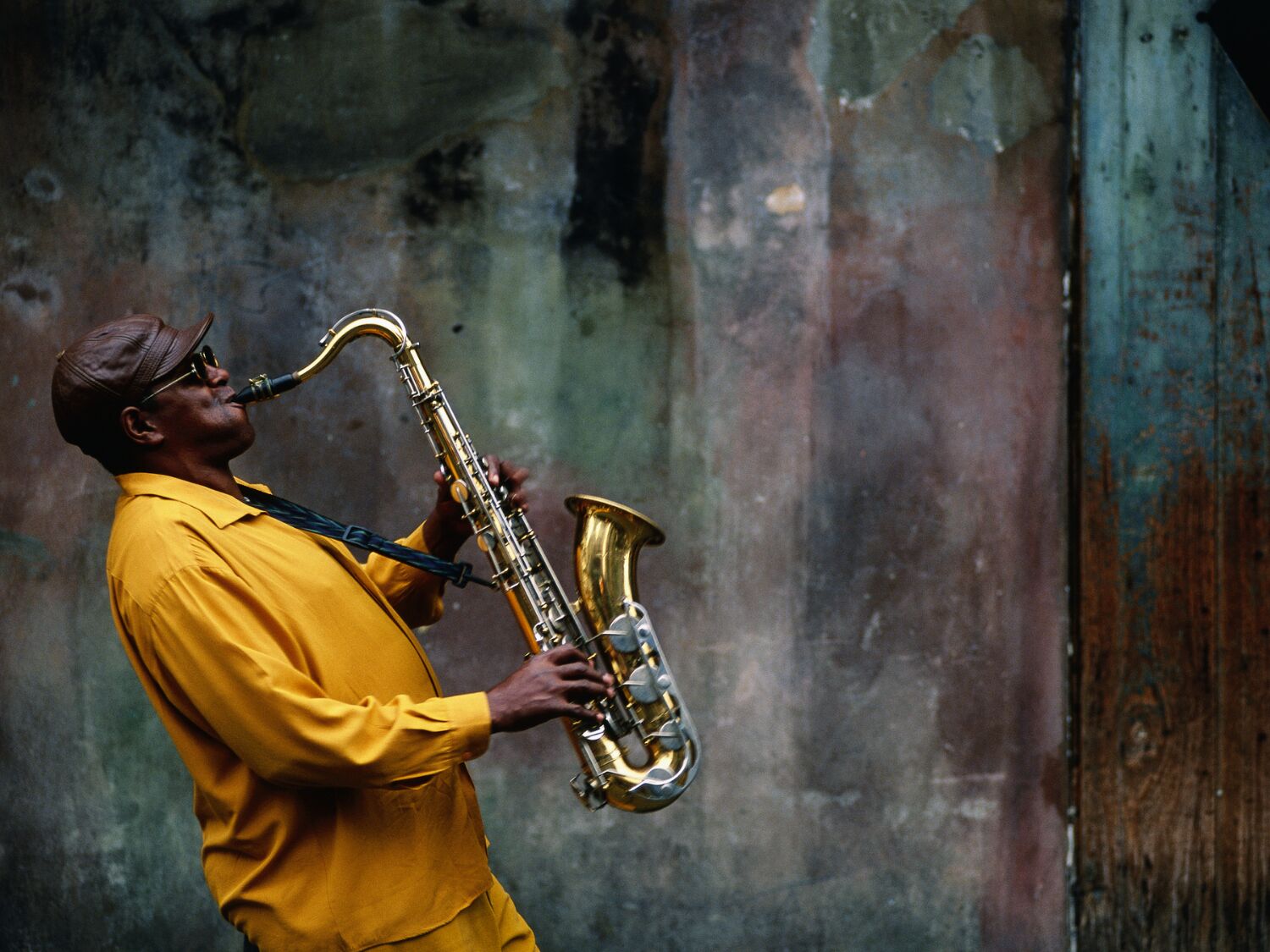A Lawyer-Backed Guide to Wedding Ceremony Musician Contracts

The wedding ceremony is, of course, the most important part of your special day, which is why you'll want to choose your wedding ceremony musicians carefully. Moreover, these performers (including harpists, pianists, string ensembles, etc.) will ultimately set the tone for your "I dos." Once you've found your vendor on The Knot Marketplace, you'll sign a wedding ceremony musician contract to seal the deal. Similar to your wedding band and DJ contract for the reception, the wedding ceremony musician contract should outline specific responsibilities and key points to ensure each party is protected under the law. Below, we're breaking down what exactly to include, as well as professional insight from a lawyer.
1. Event details
"As a starting point," says Leah Weinberg, Co-Founder and Partner of Oduberg Law, LLP, "check the contract with your ceremony musicians for the basics like date, time, and location." While it may seem like a no-brainer, the lawyer says that contacts with incorrect dates are more common than you'd think! "That said, "When reviewing the contract, don't forget to check these preliminary items off your list first."
2. Contact information
Like event details, contact information is another simple yet important detail that's surprisingly overlooked. Ensure your wedding ceremony musician contract includes all necessary contact information (i.e., phone numbers, addresses and emails). If you have a wedding planner or day-of coordinator, add their info, too!
3. Exactly how many musicians you've booked & their names
Your wedding ceremony musician contract should state exactly how many musicians you've booked, as well as their names and what instruments they'll be playing. It's also a good idea to include information about substitute musicians in the case of an absence or an emergency. Remember, it's always better to be safe than sorry by planning ahead!
4. Attire guidelines
As the to-be-weds, you should absolutely have a say in what your musicians wear. For example, if you're having a black-tie wedding, you may want them to dress up more formally than you would if you were having a beach wedding. It's important to specify all this information in writing in the wedding ceremony musician contract.
5. A list of what they'll play
Include any and all ceremony song requests in your contract. Similarly, says Weinberg, "If you've negotiated with your ceremony musicians that they are going to learn a specific song (or songs) for your ceremony, put it in the contract!" She continues, "Many ensembles have their typical repertoire, and learning something new can be time-consuming, so if your musicians are specifically agreeing to learn something new just for you, get that in writing."
6. Amount of time they're expected to perform
Wedding ceremonies can range in length, so be clear about how long yours is expected to last. Also, chances are your wedding ceremony musicians will start playing music a little before the ceremony officially starts (such as when guests begin taking their seats, which is known as the prelude). Of course, don't forget about the recessional or interlude, either!
7. Technical requirements and equipment
"Make sure the contract is clear on the technical requirements of the musicians," says Weinsberg. For example, says Weinberg, "Many musicians specify in their contract that they need ARMLESS chairs!" This is also the section to iron out other specific details, such as how much space they need to play, if you have to provide any equipment or what kind of power source they could possibly need. "You don't want surprises on the wedding day, and some things might cost you extra to provide or for the musicians to provide, so be sure that the contract specifies what they need, who is providing it and who is paying for what."



8. Setup times
Find out how much time your musicians need to set up—and include that in the wedding ceremony musician contract! What's more, explains Weinberg, "Not only does having this in the contract help guarantee that you've got their performance space ready upon arrival, but it also lets you know what to expect on the wedding day."
9. Fees and overtime rates
According to Weinberg, "things won't always run on time on your wedding day," which is why it's "going to be helpful for you to know upfront" what the cost is in the event of delays—especially "if your ceremony is running meaningfully late (like more than 15 or 30 minutes." With that in mind, it's crucial to include a clause that ensures their flexibility should you need them to play longer.
10. Payment terms
Per Weinberg, "payment terms are super important," which is why you'll want to "ensure that the total cost matches the price you've agreed to." Additionally, she says, "Pay close attention to the timing of all of the payments" since "it's not your vendor's responsibility to remind you when payments are due." That said, it's essential to stay on top of them to avoid penalties.
11. Responsibilities of Both Parties
If you haven't already, use this section to explicitly list out what you are responsible for versus what the ceremony musicians are responsible for. This will help avoid any mishaps or confusion as you inch closer and closer to the wedding day.
12. Cancellation and refund policy
This section of your wedding ceremony musician contract should clearly outline what happens in the event of a date change or cancellation. One of the most important questions you can ask is how much time is required for changes, along with how long you have to cancel without incurring extra fees.
13. Liability and Insurance
Be sure to outline what happens in case of an accident or damage and include relevant details on whether the vendor has liability insurance. It's also a good idea to have them provide proof of said insurance to cover all of your bases.
14. Weather-related needs
"Weather is going to be one of the most unpredictable elements on your wedding day, and your ceremony musicians are going to know that, too," says Weinberg. "Make sure you review your contract for your musicians' weather-related needs, whether it's a requirement that their performance area be protected from the elements or even specific temperature requirements for their performance area."
15. Signatures
It's best practice to have each party sign and date any contract, which is why we recommend doing so for this one.
16. Additional Terms
If applicable, use this section of your wedding ceremony musician contract to address any other questions or concerns pertaining to your special day. The goal? To help manage expectations and communicate as effectively and efficiently as possible.




















